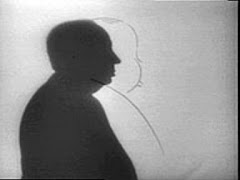Chantal Akerman oversees a vocal recording for a musical in Les Années 80 (The Eighties, Akerman, 1983).
An interesting observation about auteurism by Ivone Margulies, author of the great book Nothing Happens: Chantal Akerman’s Hyperrealist Everyday, in an interview by Ricky D Ambrose posted on the Tisch Film Review website (my emphasis):
My weakest work is when I try to discuss an idea without paying attention to the form. I don’t see the two as separate. Formalism for me is someone like Bordwell, who really is describing a shot; he’s so good at what he does, and it’s helpful. I’m not putting it down at all, but formalism ends there. You can’t be halfway. If you’re fully a formalist, you’re not just a formalist. There’s a way in which you need to return to the filmmaker, to what she is doing, and to be particular. I’m an auteurist in that sense; I think that people have their signature and that it cannot be forged. And that comes back to the idea of the long take, and questioning why are there people that are weaker at using it than others. And Akerman, too, is not always good. There are points where she seems almost Mannerist.
While I concur with Margulies' background point, here, about the particularity of individual human experience, and thus of biography (cf. J. P. Sartre's '"Valéry is a petit bourgeois intellectual, no doubt about it. But not every petit bourgeois intellectual is Valéry '), I am not sure I agree with her about the resistance to forgery of auteurist signatures.
If 'signature' is what is repeatedly recognisable as such by a critic, then it is difficult to argue, in broad terms, that it could not be copied or appropriated by others. But is there a part of 'signature' - some deep mark of authenticity, some very particular aspect of the film artist's handling - that cannot be 'captured' or reproduced?






No comments:
Post a Comment